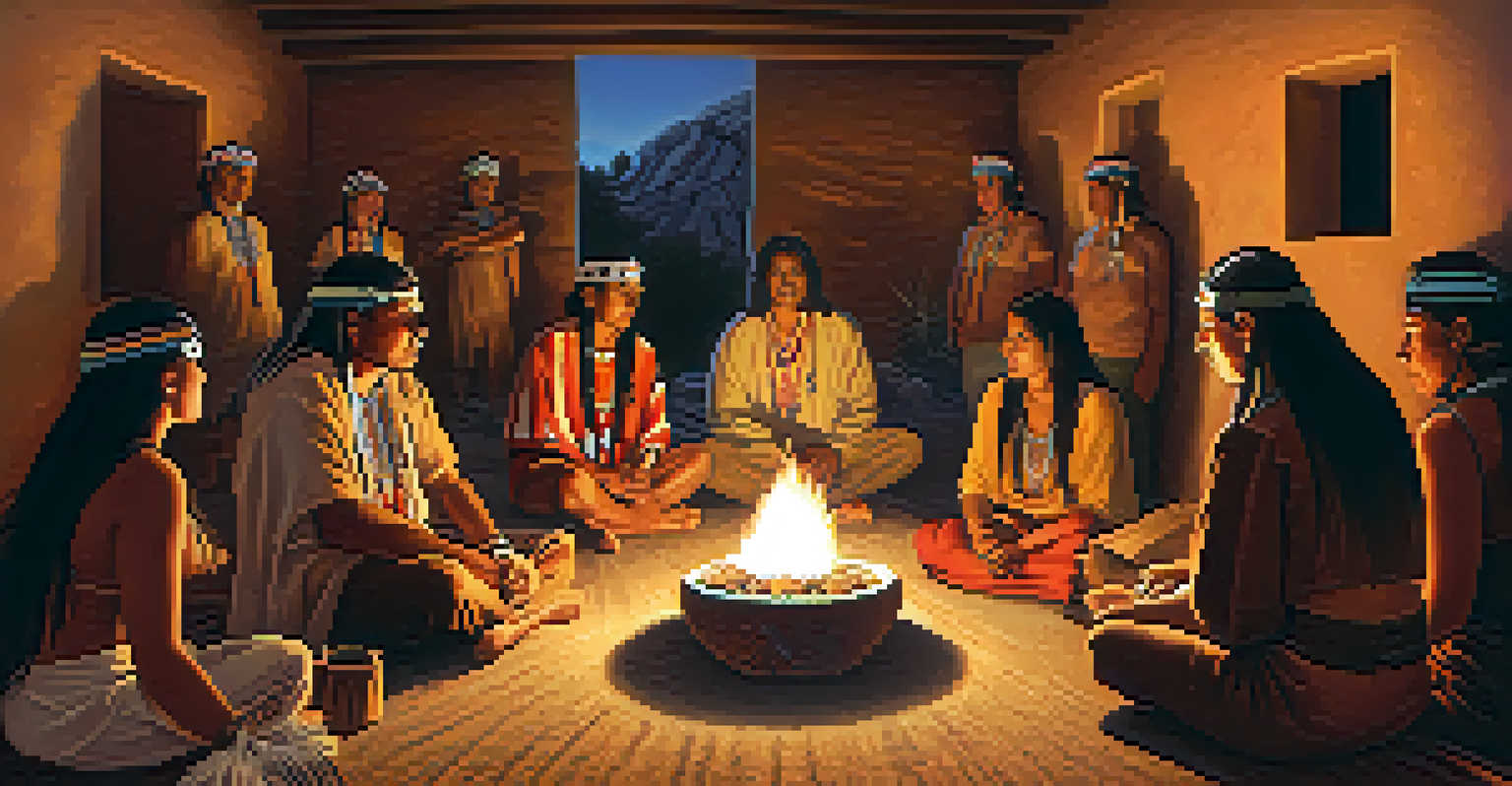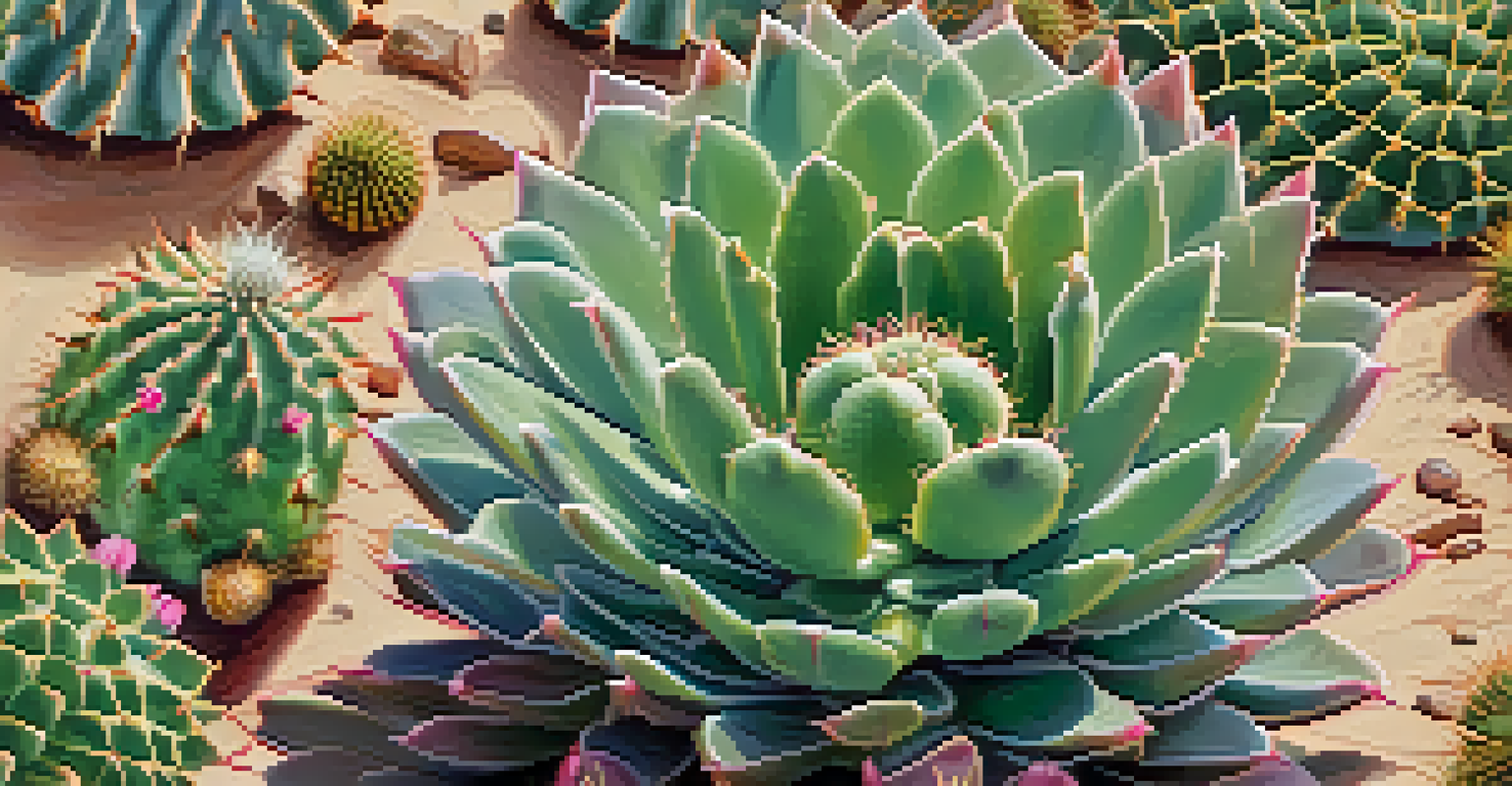Peyote's Influence on Personal Reality and Identity

Understanding Peyote: A Brief Overview
Peyote, a small cactus native to Mexico and the southwestern United States, contains the psychoactive compound mescaline. Traditionally used in Native American spiritual practices, peyote has garnered attention for its mind-altering effects. These effects can lead to profound changes in perception, often altering one’s sense of reality and identity.
The use of peyote can lead to profound insights into one's identity and existence.
The cactus has been used for centuries in religious ceremonies, helping individuals explore their inner selves. It serves as a tool for self-discovery, encouraging deep reflection and introspection. Through these experiences, users often report shifts in their understanding of personal identity and the world around them.
This unique relationship between peyote and personal insight makes it a fascinating subject for those interested in psychology, spirituality, and cultural practices. Understanding peyote's role can shed light on how it influences individual perspectives on reality.
The Psychological Effects of Peyote
When ingested, peyote can induce altered states of consciousness, leading to vivid hallucinations and intense emotional experiences. These psychological effects can prompt users to confront their beliefs, fears, and desires. As the mind expands, individuals often find themselves questioning their identities and how they fit into the broader tapestry of life.

Many users report a feeling of interconnectedness with nature and the universe, which can lead to significant shifts in personal identity. This sense of unity challenges the conventional boundaries of the self, allowing for a more fluid understanding of who they are. Such experiences can be transformative, fostering personal growth and new perspectives.
Peyote's Role in Self-Discovery
Peyote is traditionally used in Native American spiritual practices as a tool for self-exploration and personal insight.
However, it's essential to approach these experiences with caution. While the psychological effects can be enlightening, they can also be overwhelming for some. Understanding one’s mental health status and preparing for the experience is crucial for safe exploration.
Cultural Significance of Peyote Use
In Native American cultures, peyote is revered as a sacred plant, integral to spiritual practices. Ceremonial use often involves prayer, song, and community, creating a shared experience that strengthens cultural identity. This collective aspect enhances individual journeys, blending personal insights with communal values.
In the depths of the soul, we can find the essence of who we are, often illuminated by the experiences we undergo.
The significance of peyote extends beyond mere recreation; it serves as a bridge between the physical and spiritual realms. By participating in these rituals, individuals not only explore their realities but also connect with ancestral traditions. This connection can profoundly influence one's sense of identity, linking personal experiences to a larger cultural narrative.
As more people become aware of peyote's cultural importance, there's a growing dialogue about its respectful use. This awareness fosters appreciation for indigenous cultures and the wisdom they offer regarding identity and consciousness.
Peyote and Personal Identity Transformation
For many, peyote experiences catalyze significant transformations in personal identity. The introspective journey can lead to the dissolution of ego, allowing individuals to reevaluate their self-concepts. This process often reveals hidden strengths and vulnerabilities, reshaping how one perceives themselves.
As users navigate the altered states induced by peyote, they may confront aspects of their identity they had previously ignored. This confrontation can lead to cathartic releases, providing clarity and a renewed sense of purpose. For some, these revelations can be life-changing, guiding them toward more authentic ways of living.
Psychological Effects and Risks
While peyote can induce profound psychological experiences, it also carries risks such as anxiety and unpredictable physical effects.
The transformation is not always immediate; it often unfolds over time. Individuals may find themselves gradually integrating insights gained during their experiences into their daily lives, leading to lasting changes in behavior and mindset.
Challenges and Risks of Peyote Use
While peyote can facilitate profound experiences, it also poses risks that should not be overlooked. Psychological challenges can arise, including anxiety, paranoia, or overwhelming emotions. For those with pre-existing mental health issues, these risks can be heightened, making it essential to approach peyote with caution.
Additionally, the physical effects of peyote can be unpredictable, leading to nausea or discomfort during the experience. Understanding these potential side effects is crucial for anyone considering peyote use. Setting intentions and having a safe environment can help mitigate some of these risks.
Ultimately, weighing the potential benefits against the risks is vital for a responsible approach to peyote. Education, preparation, and self-awareness play key roles in ensuring a positive experience that aligns with personal goals and values.
Integrating Peyote Experiences into Daily Life
After a peyote experience, individuals often seek to integrate their insights into everyday life. This process can involve journaling, meditation, or discussions with trusted friends. By reflecting on their experiences, users can distill meaningful lessons that resonate with their identities.
Integration is not always straightforward; it may require patience and ongoing self-reflection. Those who embrace this journey often find a renewed sense of clarity and purpose in their lives. This newfound understanding can lead to healthier relationships, improved self-esteem, and a deeper connection to their passions.
Cultural Significance and Future
Peyote's cultural importance fosters a deeper understanding of identity and consciousness, making responsible exploration essential as interest in psychedelics grows.
Ultimately, the goal of integration is to translate the insights gained from peyote into actionable changes. This transformation can foster a more authentic and fulfilling life, aligning personal reality with the deeper truths uncovered during the experience.
The Future of Peyote in Personal Exploration
As societal attitudes toward psychedelics continue to evolve, peyote's role in personal exploration is gaining renewed interest. More individuals are seeking out these experiences as tools for self-discovery and healing. This shift opens up conversations about the ethical use of peyote, especially concerning its cultural significance and sustainability.
The future may see increased accessibility to peyote for therapeutic purposes, highlighting the need for responsible practices. As research into psychedelics expands, understanding how peyote can benefit mental health will become increasingly important. This growing interest could lead to a resurgence of traditional practices intertwined with modern therapeutic approaches.

In this evolving landscape, respecting the cultural roots of peyote while exploring its potential for personal growth will be crucial. As we navigate this journey, the insights gained from peyote will continue to shape our understanding of identity and reality.